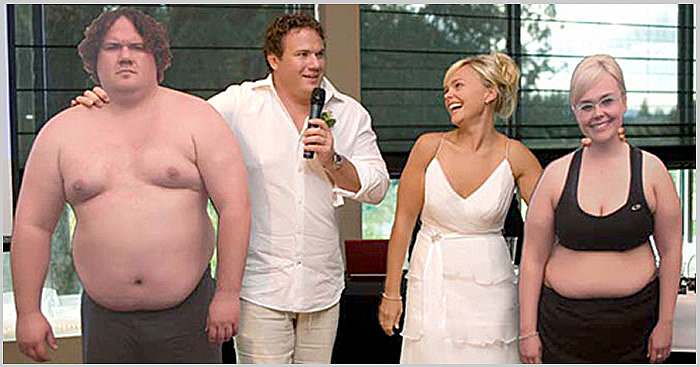Weight Loss? Work at It : Lifestyle of Physical Activity
 |
| Michelle Aguilar, Season 6 : She weighed 242 pounds at the beginning of the show and 132 pounds at the end to claim the prize. |
"The high levels of physical activity energy expenditure and total daily energy expenditure observed in successful weight-loss maintenance suggest that the group relies on high levels of energy expended in physical activity to remain in energy balance [and avoid weight regain] at a reduced weight."
"Taken together, these results suggest that physical activity may play a relatively greater role in weight loss maintenance and chronic restriction of energy intake."
Research, University of Colorado
 |
| Matt and Suzy Hoover, Season 2 : He lost 157 pounds and she lost 95 pounds but have since gained some of the weight back |
Weight loss experts have recently cautioned that depending on exercise alone as a remedy for losing unwanted weight is unreliable. To be sure, altering eating habits does go far in helping to lose weight, but studies have long shown that weight loss resulting from diets invariably ends with the lost weight being regained. The combination of changing what and how we eat and matching it with another lifestyle change; regular exercise, is the winning combination. On the other hand, sustainability remains a door-stopper for many people.
A physiological change occurs when someone loses a significant amount of weight and their body becomes lighter. A heavier body burns more calories than a lighter body, relying on the reduced effort involved in moving a smaller mass. Fewer calories are also burned during rest periods. So maintaining a lost-weight status becomes more difficult than attaining that lost-weight new-you, to begin with.
Popular reality show The Biggest Loser hosted overweight people featured in their struggle to lose weight. The popularity of the show may have tanked because many of the featured subjects regained all the weight they lost. A database of people who registered with the National Weight Loss Registry of those who lost a minimum of 30 pounds for at least a year provided a valuable source of weight-loss information. In both instances, the show and the registry subjects provided a view of how much exercise is needed to restrain lost weight from returning.
Self-reported data, however, such as that obtained from both those sources is not strictly reliable; people may have a tendency to overestimate the exercising they describe. And this is where a group of researchers from the University of Colorado stepped into the picture. They put together three groups: people who had succeeded in maintaining a substantial weight loss for at least a year (30 pounds or more); normal weight subjects with body mass indexes similar to the weight-loss maintainers; and overweight people with a BMI similar to the weight-loss group pre-weight-loss.
 |
| Bill Germanakos, Season 4 : He lost 164 pounds on The Biggest Loser and only gained 37 pounds back after the show |
As compared to the normal and overweight subjects, weight maintainers accumulated more steps per day, as well. The maintainers expended around 12 calories/kg/day in comparison to the normal weight (10 calories/kg/day) and overweight group (seven calories/kg/day. Compared to 8,900 steps taken by the normal weight subjects and 6,500 by the overweight group daily, the weight-loss maintainers logged 12,100 steps, according to the researchers.
The International Association for the Study of Obesity recommends individuals hoping to ensure lost pounds don't return should commit to 60 - 90 minutes of moderate intensity physical activity (walking) or 30 - 45 minutes of intensive physical activity (running) daily. The study made no effort to control for diet; the researchers suggesting the number of calories consumed daily would in all likelihood be close to the number of calories expended; energy balance typically associated with maintenance.
The end result appears to reinforce health researchers' advice to alter daily habits, starting with awareness of the food quality, quantity and nutrition one eats, and including more physical exercise. Move more, consume energy more.
 |
| Ali Vincent, Season 5 : She was the first female to win on the show with an 112-pound weight loss. She managed to maintain the weight after the show. |

0 Comments:
Post a Comment
<< Home